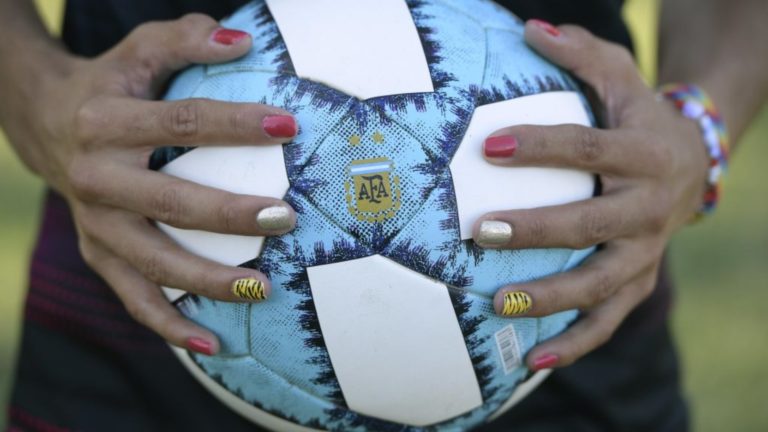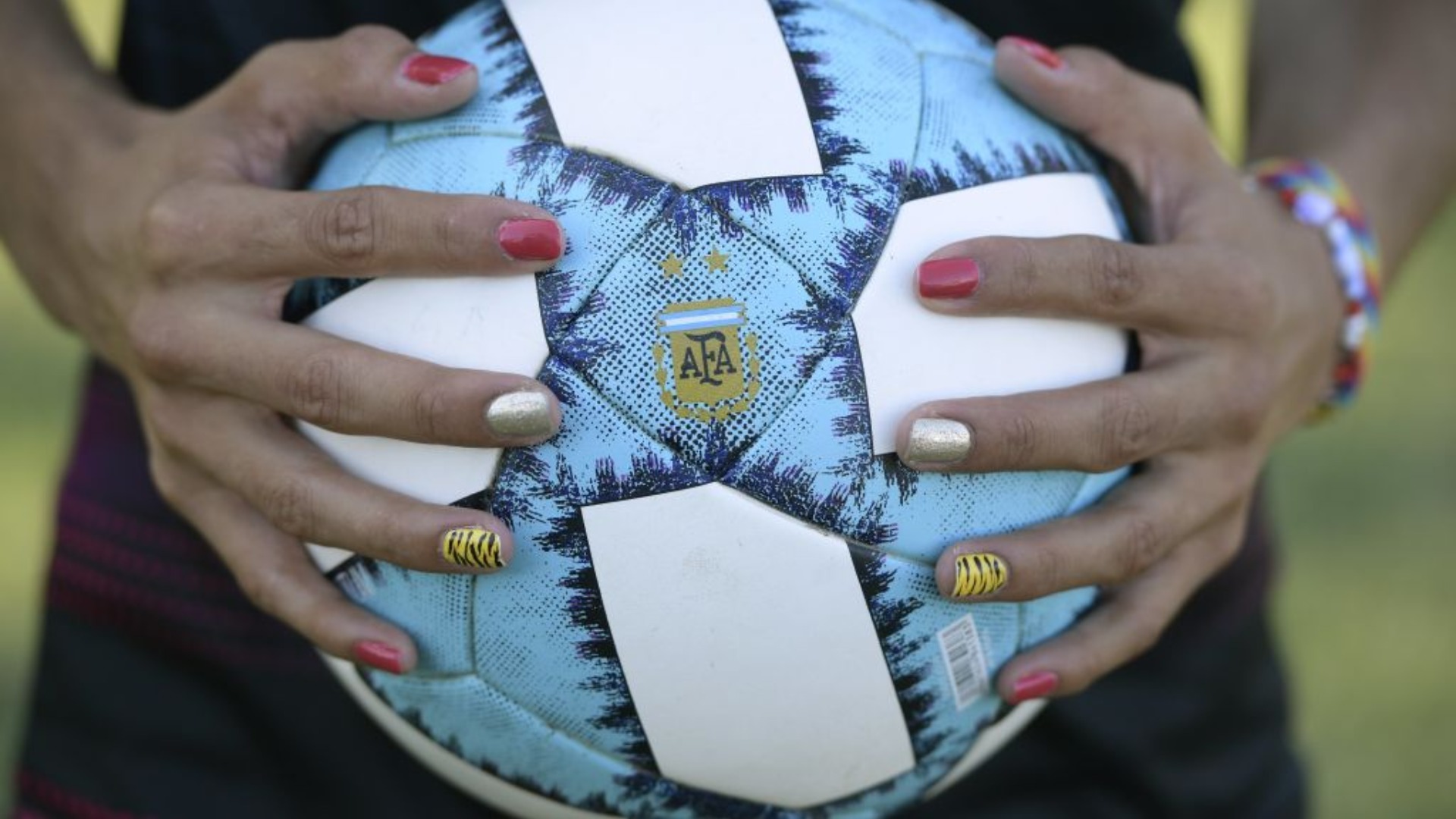

Florida Governor Ron DeSantis signed a bill into law Tuesday banning transgender girls and women from competing on female sports teams. The Republican governor says it’s to protect the fairness of women’s athletics, but LGBTQ advocates say the law is discriminatory. Jenny Pizer, the director of law and policy at Lambda Legal, joins CBSN’s Elaine Quijano with her analysis.
Video Transcript
ELAINE QUIJANO: Controversy is growing around legislation aimed at banning transgender athletes from playing in girls’ and women’s sports. On Tuesday, the first day of Pride Month, Florida Governor Ron DeSantis signed a law banning transgender girls from playing on female sports teams. The Republican governor says the legislation will protect athletes from competing against others who are physically superior to them.
Similar bills have been signed in several other states. This comes as the US awaits a significant Supreme Court decision on a case out of Philadelphia. It could demonstrate how the conservative 6-to-3 majority will rule in future LGBTQ rights cases.
For more, I want to bring in Jenny Pizer. She’s the Director of Law and Policy at Lambda Legal. Jenny, welcome. Thanks very much for joining us. First, why was Lambda Legal formed? What is the mission of your organization? And what are some of the current initiatives that you’re working on?
JENNY PIZER: It’s great to be with you. Lambda Legal is coming up close to our 50th anniversary. We were formed in New York City in 1973 to advocate for and provide legal services for LGBTQ people in a full range of areas of law– law reform, litigation, policy advocacy, and public education– about who we are as LGBT people and to provide the legal work that we need to secure full nondiscrimination rights at every level of government.
ELAINE QUIJANO: So as we mentioned, Jenny, Florida became the latest state on Tuesday to sign a transgender athlete ban into law. Governor Ron DeSantis says it’s an effort to, quote, “protect the fairness and integrity of women’s athletics.” What is your response to that? And what does this law mean for trans athletes who may already be playing on girls’ and women’s teams?
JENNY PIZER: Yeah. Unfortunately, this new Florida law has– is similar to a whole raft of similar proposals that we’ve seen this season. It’s really just exploded across the state legislative landscape.
To give you a sense of the magnitude of it, we have a count at this point of more than 300 bills proposed in states this year to limit LGBTQ legal rights. And about half of them have focused on limiting legal rights of transgender folks. About 40 of them would limit access to medically appropriate care. And about 75 are about access and participation in school sports and sports teams.
At this point, by our count, eight of those bills have been signed into law, including Florida’s that was just signed. Three have been vetoed. And unfortunately, a few more are expected.
What’s important for people to understand is that laws like Florida’s apply in a blanket way to kids at all levels of education. So Florida’s law applies to middle school, to high school, to sports clubs and intramural teams.
This is not just about competition for top prizes or scholarships. This is about students’ ability to participate in sports programs that can be for kids who like sports– and it’s not everybody that likes sports– but for those who do, an opportunity to be a member of a team and to be healthy and to participate and learn those life skills that can be really important, you know, sportsmanship and working together and self-discipline.
And the Florida law has a number of elements that I think may cause the state some serious problems because it creates a legal claim for students who feel that they were harmed somehow by there being a transgender girl participating in some sports program and can create liability for school districts that want to follow both medical science and the law that applies. There’s a federal law that governs sex discrimination in education that protects transgender kids in school.
And this new law seems like it may be on a collision course with federal law. So at Lambda Legal, we’ve been watching all of these bills closely and preparing to litigate in some places where we think it’s appropriate to do that.
The key thing to keep in mind is that the bill defines sex as male or female, and lots of people understand it that way. But by medical science, sex is a lot more complicated. What creates your sex is a lot more complicated than what somebody wrote on the birth certificate when you were born.
There’s hormones. There’s chromosomes. There’s any medical treatment you might have had growing up if you’ve been diagnosed with gender dysphoria. Sometimes anatomy is ambiguous. The reality is life is more complicated sometimes than these two options written on the birth certificate at the time of birth.
The courts have recognized that. The Biden administration has recognized that. And schools need to recognize that, too. And they have been.
Look, the reality is, in many states, there’s been protection requiring fair inclusion and nondiscrimination against transgender kids for many years now. And kids participate in sports. There hasn’t been a problem.
Certainly there’s not been a problem in Florida or these other states where these laws are being considered. It’s really legislation in search of a problem and a purpose as part of a social reaction to maybe a recognition of some kids that people didn’t realize were there. They’re just kids. And some of them are particularly vulnerable to bullying and exclusion.
So we think this law was a mistake. And as I said, we’re lawyers. And our mission is to protect LGBTQ people, including trans kids, from discrimination. And the Florida bill and the other bills like it– they’re discrimination.
ELAINE QUIJANO: Well, we know, according to one survey, transgender youth are far more likely than their nontransgender peers to experience depression, nearly four times the risk, according to one study. Jenny, as an advocate for the LGBTQ community, what message do you think these kinds of laws send? And what do you think they actually do mean for the future of trans rights? It sounds like you’re anticipating here some litigation moving forward.
JENNY PIZER: I think there will be litigation, just as we have seen litigation to deal with the so-called bathroom bills that said– limited where– which restrooms people could have access to and other kinds of limitations on access to facilities. And in fact, Idaho passed a law similar to the law that Florida and some other states have just passed. And the federal court blocked it, recognizing that it was about discrimination. There was not a good factual basis for it.
So I think there will be more litigation. The real answer longer term is that more trans people come out, just as it’s been so important for same-sex couples to come out, and that we as a society recognize that transgender people have always been among us, just like lesbian, gay, and bisexual people have always been part of the community. The question is whether people are respected for who they are and have a chance to participate in ways that are fair, don’t harm anybody, but actually can be very important for self-esteem, support, and to reduce bullying.
When there are laws that discriminate, it sends a message that people are not welcome. They’re not OK. There’s something different and wrong about them. And that tends to invite more bullying against the very kids that most need our support and our inclusion and the ability to just play.
This is just– the kids should be able to play. And recess time and sports time, club time is just as important sometimes as the classroom lessons. And all of the kids need to be allowed to participate and just recognized for who they are. They’re not causing anybody problems. They just need to be recognized and included for who they are.
ELAINE QUIJANO: You mentioned same-sex couples. Jenny, you have been a major proponent of same-sex marriage. What issues do same-sex couples continue to face here in the US?
JENNY PIZER: Yes. Well, certainly having won in the US Supreme Court a couple of years ago in the marriage equality litigation, we celebrated that. That has made a big difference. But it hasn’t resolved everything.
The reality is that there have been residual types of discrimination. And Lambda Legal is litigating to challenge some of that now– for example, the rules that require couples to have been married for at least nine months in order for a survivor, if one passes away, to be recognized for Social Security survivor benefits.
Well, some of our clients and some members of our community were not able to be married for nine months because the law discriminated. So folks who have been together sometimes for many decades who are elderly did marry but have been deemed by the federal government ineligible for those Social Security benefits in the program that they paid into just as other people have done. So we’re litigating about that, and we’ve had success so far.
And then there were other survivors of same-sex partnerships who never had a chance to marry because the law prevented that while they were together. Even if they were together for many decades, they didn’t both live long enough to marry. And again, the survivor, then, is denied the benefits that they should have from the system that we all pay into. So that’s just one example of residual, if you will, sort of cleanup litigation that we’re having to do.
And then there are just practical realities that are kind of specific to same-sex couples who have been together sometimes for many years and then, after being together for many years, got married. And the marriage and legal protections only cover part of their relationship. If they divorce or if there are some types of legal problems, their legal status doesn’t necessarily reflect the depth of the relationship, the amount of commingling of their assets, and so forth.
So winning equality under the law has been tremendously important both as a legal matter and as a social matter for appropriate recognition of of who we are and that our relationships are solid and committed family relationships just like other relationships. But we do– we do still have some ongoing cleanup work to do.
ELAINE QUIJANO: Jennifer Pizer with Lambda Legal, thank you very much for your time.
JENNY PIZER: My pleasure. Any time.